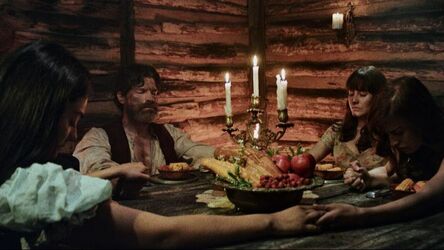 As a genre lover, I am most drawn to folklore and cult-related tales of moral dilemmas... ...Stories of lost souls trying to convince the world, and perhaps themselves, that they know a secret truth are some of the most fascinating examinations of human nature. The search for legitimacy and purpose is so often restricted by false promises and dogmatic methods that it in turn frequently presents more danger than hope. Juan Diego Escobar Alzate’s Luz: The Flower of Evil is a powerful meditation on the frailty of the human condition and exploration of the dangers of extreme belief above rational thought. Its slow-burn pace brings the viewer into a world that feels far removed from conventional society. It is a story of a man in control, who knows deep down the power he wields will fade away and leave him behind. The film explores religion in a way that hones in on its darkness against a backdrop of light. The many occasions of beauty and jaw-dropping scenery are juxtaposed with the characters’ feeling the dread of existence in the smallest moments. El Señor (Conrad Osorio) lives in the middle of nowhere Colombia, in a village seemingly unimpacted by the modernity of what may be the 1970s or ‘80s, with his daughter Uma (Yuri Vargas) and two other girls he has taken in/adopted as his own, Laila (Andrea Esquivel) and Zion (Sharon Guzman). The film begins as their mother, Luz, has passed away and left a heartbreaking void in their lives. El Señor is a religious zealot that comes across as more of a cult leader than a father—like when Uma finds a cassette tape in the nearby woods and he goes on tirades about how music is the work of the devil. He refers to his children as Angels and is intensely obsessed with their purity. His control over the narrative that his children and the townsfolk receive about the outside world is dangerous and damaging, conveyed masterfully through Osorio’s performance. The most unhinged and truly scary example occurs when El Señor claims to the villagers that a young boy who has recently arrived is the second coming of Christ. However, instead of treating this child with the reverence of a savior, he chains him up outside of his house. The child’s capture, seen through the eyes of Zion, the youngest girl in the house, is immensely disturbing. It is in these glimpses into the fanatical mind of El Señor, and into what each of the children goes through raised in such an environment, that the film works exceptionally well. In terms of plot, Flower of Evil is pretty light. It chooses instead to show us the quiet moments that exist in this strange reality, focusing on the daughters specifically. The viewer experiences Zion and Uma grasping to understand what El Señor preaches while also trying to cope with the death of Luz, to whom each seemed to have been strongly connected. The script by Alzate does wonders with the small space of its Colombian backdrop and allows the viewer to be thrown into a world that is structurally designed by El Señor. With this masterclass attention to detail, the modern world slowly fades away and the viewer seeps into the lives of the daughters. One of the strongest elements in the film is the cinematography by Nicolás Caballero Arenas which takes the beautiful setting and animates it with every frame. Every moment is told with such purpose and the visuals add an intensity that fully envelops the viewer in the story. This is truly one of the prettiest films I’ve seen all year. At times it reminds me of the work of Terrence Malick--the highest compliment I can give since no one is better, to my mind, at turning the simplest moment into something magical. Arenas, with his camera work, and Alzate, with his script and direction, have pulled off that trick here. This film may not be for everyone, but if the viewer allows the slower pace and the performances to exist and push the admittedly thin narrative forward, there is a lot to be gained. I highly recommend Luz to fans of horror folklore and the films of Terrence Malick. I think this team has created something special that can truly be thought-provoking and moving, with images that I can’t get out of my head and performances to match the fantastic landscape. The profoundly dark side of human existence is on display in Luz: Flower of Evil. If such darkness intrigues you as it does me, I recommend giving it a chance. Luz: The Flower of Evil is now available on Digital/VOD from Dark Sky Films. By Justin Drabek Enjoy Justin's writing? Leave him a tip here through Cash App!
1 Comment
9/26/2020 01:22:54 am
Its slow-burn pace brings the viewer into a world that feels far faraway from conventional society. it's a story of a person on top of things , who knows at heart the facility he wields will dissolve and leave him behind.The most unhinged and truly scary example occurs when claims to the villagers that a young boy who has recently arrived is that the Second Coming of Christ. However, rather than treating this child with the reverence of a savior,
Reply
Leave a Reply. |
Archives
March 2023
|


 RSS Feed
RSS Feed